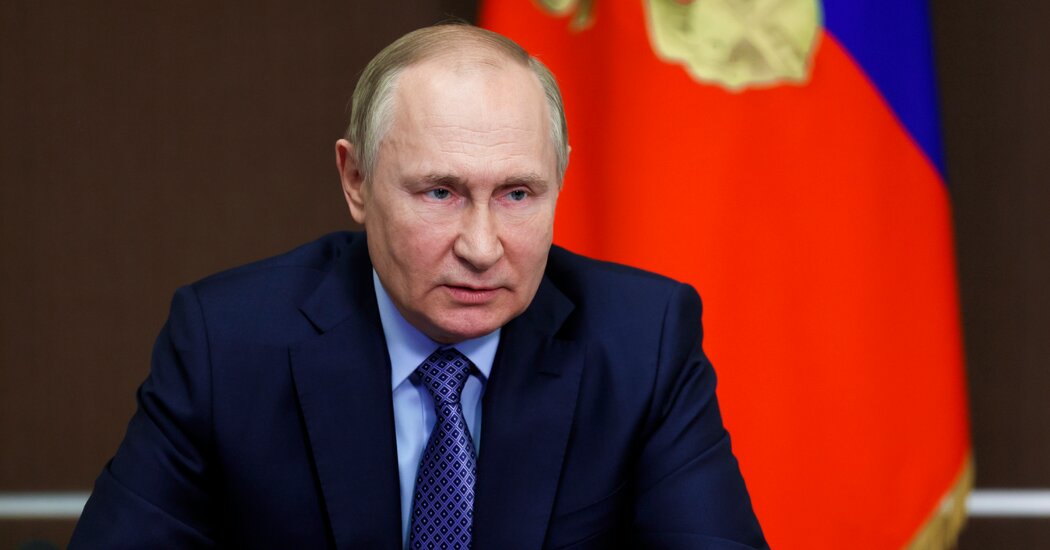
President Vladimir V. Putin of Russia began ramping up his nuclear rhetoric this fall, raising the specter that he could use such a weapon in Ukraine. As Mr. Putin was making threats, senior Russian generals were discussing the circumstances when they might possibly use a tactical nuclear weapon, The New York Times reported.
American officials said they have seen no movement of Russian nuclear weapons and do not believe that the Russian government has decided to detonate such a device. But as Russia suffers setbacks on the battlefield, even talk about using one has raised alarm.
How concerned should we be?
Russia has as many as 2,000 tactical nuclear weapons, lower-yield devices designed to defeat conventional forces on the battlefield. A tactical nuclear weapon has never been used in combat, but one could be deployed in a number of ways, including by missile or artillery shell.
The likelihood that Mr. Putin will use a nuclear weapon remains exceedingly low. But the prospect of even a small nuclear device going off is so terrible that officials in the United States and elsewhere are concerned. Thousands of people could be killed, and millions sickened.
Those concerns have risen with the Russian rhetoric and with U.S. intelligence about the discussions among senior generals.
“When the leader of a modern nuclear power, as Mr. Putin is, talks as recklessly and irresponsibly, as he has been doing, about the potential use of nuclear weapons in Ukraine, you’ve got to take it seriously,” John F. Kirby, a National Security Council official, told reporters on Wednesday. “And we’ve been taking this seriously since the very beginning.”
Noting Mr. Putin’s reference to America’s decision to drop atomic bombs on Hiroshima and Nagasaki to end World War II, Mr. Kirby said Russia’s actions were increasingly unsettling.
The State of the War
“We have maintained, I believe, an appropriate level of concern about the potential use of weapons of mass destruction in Ukraine, to include nuclear weapons,” Mr. Kirby said.
Could Russia just be trying to rattle the West?
American officials said it was entirely possible that the public rhetoric and private conversations among Russian officials were meant to raise fears in Washington.
The discussions, according to current and former officials, could be less about real planning and more about deterring the West from expanding its help to Ukraine.
Michael McFaul, the former U.S. ambassador, said conversations about the use of nuclear weapons should make everyone nervous.
But Russia might partly be trying to discourage the United States from sending Ukraine advanced weapons like the Army Tactical Missile System, a longer-range weapon known as ATACMS. President Volodymyr Zelensky of Ukraine wants the weapons, and some former U.S. military officials think supplying them would dramatically help the Ukrainian army put Russian targets and supply depots at risk.
Mr. McFaul said that just by talking about nuclear weapons, the Russian leader was “achieving a practical military objective.”
The Biden administration has supplied Ukraine with billions of dollars in weapons, which have changed the course of the war, but it has held off giving Kyiv longer-range missiles, tanks and fighter planes.
“The Pentagon is not sending ATACMS,” Mr. McFaul told The New York Times. “The Pentagon is not sending MIG-29s. They’re not sending tanks. They are being deterred by Putin.”
Is Russia trying to pressure Ukraine to negotiate?
It is incredibly unlikely that Russia would use a tactical nuclear weapon, said Frederick B. Hodges, a retired lieutenant general and former top U.S. Army commander in Europe. While the Soviet Red Army had war plans that involved using nuclear weapons on a battlefield and exploiting the results, Russia does not have trained troops who could take advantage of such a strike.
“Their nuclear weapons are most useful to them when they don’t use them,” General Hodges said. “There’s just no battlefield advantage at all to use any nuclear weapon.”
Instead, Russian leaders hope nuclear threats will be enough to force Ukraine into diplomatic talks and to make concessions that Russia has failed to win on the battlefield.
“They are trying to put pressure on Ukraine to negotiate and cave in to the Kremlin’s demands,” General Hodges said.
Russia wants Ukraine to concede large areas of the country that Mr. Putin illegally annexed after sham referendums this year and in 2014, when Russian forces moved into Crimea.
But General Hodges said Russia’s attempts to make Ukraine cede territory would fail. And Ukrainians, he added, simply do not believe Russia will use a nuclear weapon.
Could Vladimir Putin be trying to influence his own public?
Russia’s efforts to expand conscription and mobilize more of its population to fight in Ukraine have been unpopular. And through much of October, Russian attitudes toward a nuclear war were trending negative, according to Jonathan Teubner, the chief executive of FilterLabs, a company that has been tracking public sentiment in Russia.
But public opinion shifted after Mr. Putin and other Russian officials began talking about unfounded allegations that Ukraine was going to explode a “dirty bomb,” a munition designed to spread radioactive material. Many Western governments saw the dirty bomb allegations as an effort to create a pretext for Russia to detonate a nuclear weapon.
“Since the dirty bomb narrative, we have detected a significant increase in support for using nuclear weapons if necessary,” Mr. Teubner said.
Russian support for conscription flagged after the mobilization was announced in September, but Mr. Putin’s rhetoric about dirty bombs created a “rally-around-the-flag effect,” Mr. Teubner said.
Most disturbing, he said, the biggest shift his firm had detected by tracking discussions on online forums and social media was in the sentiment toward using a nuclear weapon.



